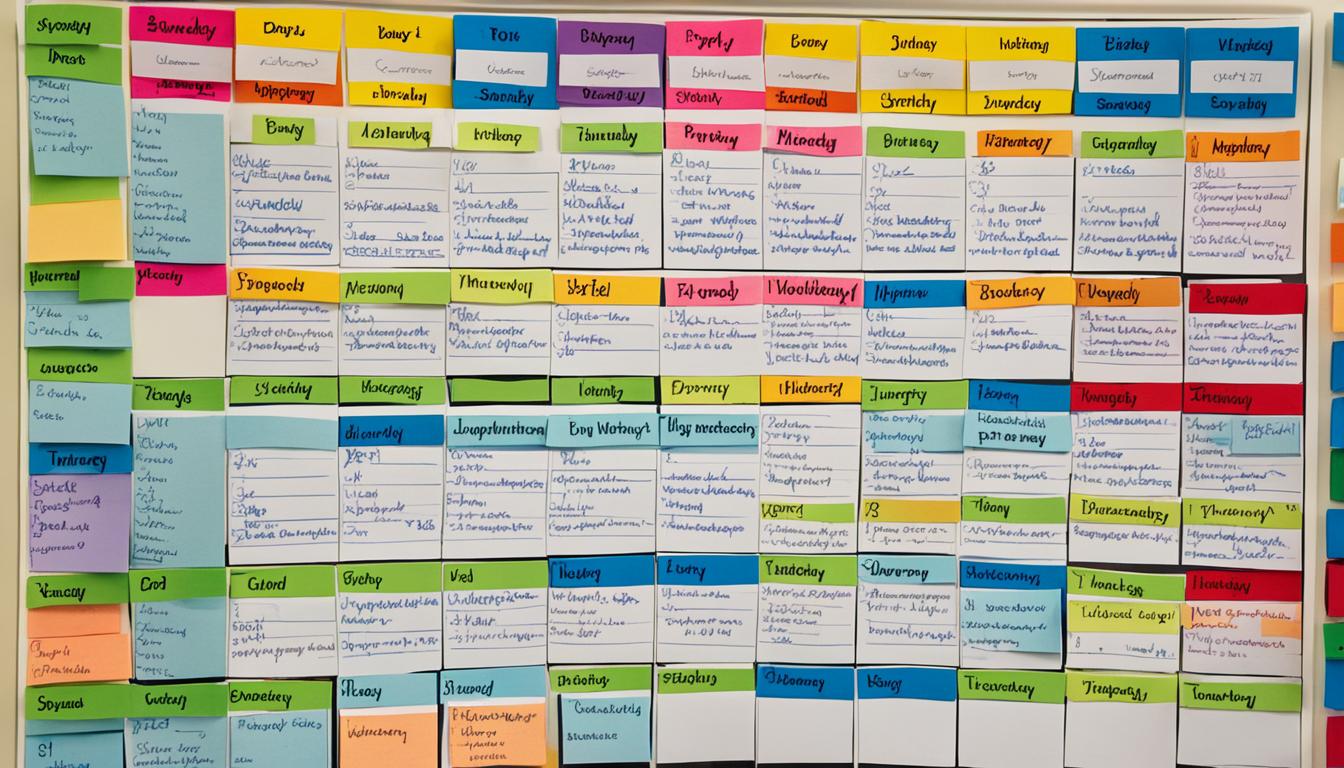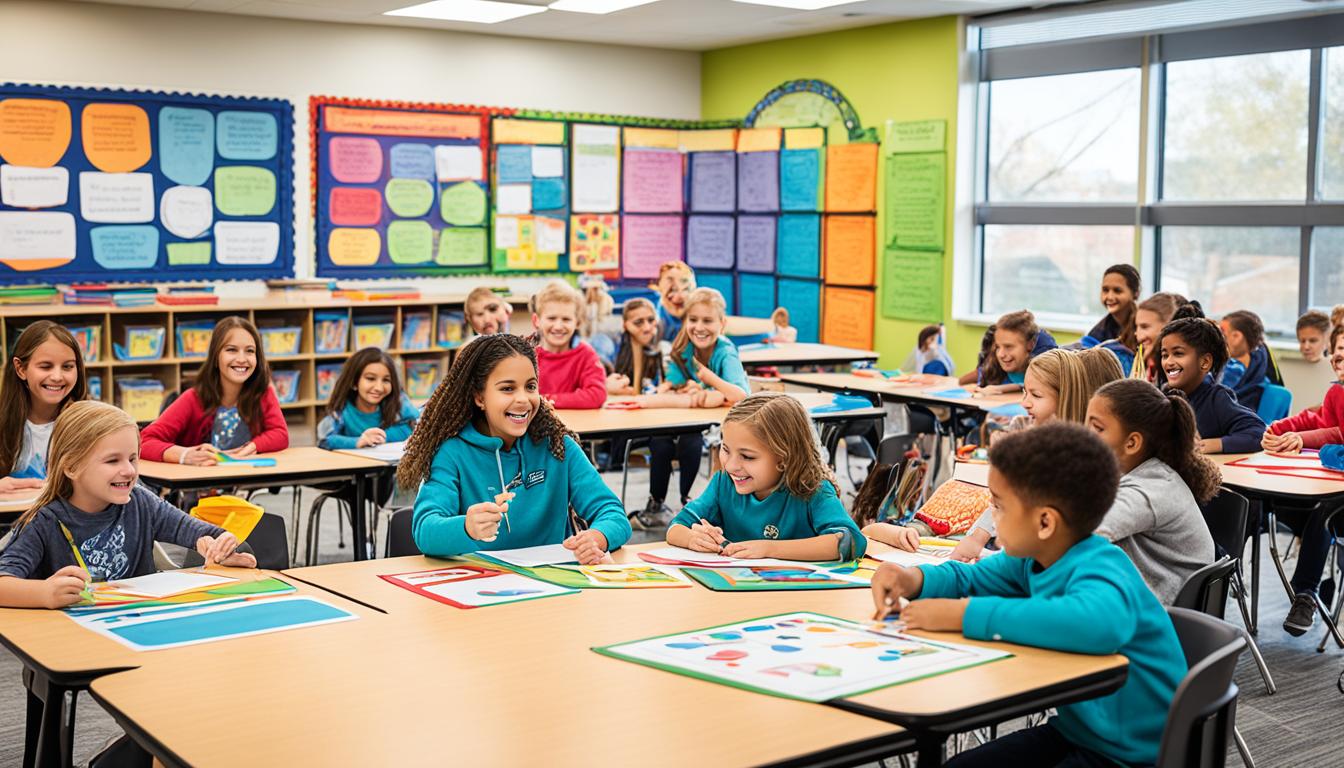Many things cause low productivity at school. Slothfulness, bad schedules, and not enough study time are big reasons. These issues are similar to low employee productivity in the workplace, where lack of resources and disengagement lead to organizational challenges. To address these problems, more companies are adopting wellness programs that promote employee health and improve workplace culture. These trends are significant in the context of the global economy, as productivity issues can lead to financial losses and affect economic performance worldwide. They lead to problems in education that need special solutions.
Lack of money, resources, and family issues make it harder for students. Not having things to study with slows them down. Feelings like doubt and getting discouraged also get in the way of doing well.
How teachers act can change how students perform. Old ways of teaching and not-so-good classrooms don’t help. Family and money problems outside school also matter. Fixing these problems is key to helping students do better.

We’ll look more into these reasons and how they affect learning. We’ll find ways to deal with them. This will help students do better in school and have a better future.
Slothfulness and Its Impacts on Academic Performance
Laziness in students can harm their schoolwork. Poor study skills, test worries, and late work come from it. These lead to bad grades. Laziness also makes students feel guilty and sad. This worsens their focus and school performance. Toxic behavior, such as bullying or manipulation among students, can create a toxic work environment in schools, further reducing motivation and productivity.
How Slothfulness Affects Students
Laziness causes many problems for students. Just as many employees are affected by toxic behaviors in organizations, many students experience similar challenges in school environments. It stops them from learning well and getting good grades. When students don’t see the point of school, they lose motivation. This results in bad time management and not following school rules.
Laziness leads to quick, often bad, choices. It brings more stress and frustration. This messes up studying and can hurt future job chances.
Strategies to Overcome Laziness
To beat laziness, students need a good plan. They should set real goals and split work into small parts. This approach can boost productivity by making tasks more manageable and less overwhelming. A good study space helps keep focus and follow a schedule. Being disciplined is key to fighting laziness.
Discipline boosts drive and helps students do well consistently. Self-control links to better grades. It also makes self-esteem and school success go hand in hand. Just as leaders encourage employees to be productive and engaged, teachers and parents can encourage students by fostering a supportive environment, motivating them to overcome laziness and improve their academic performance.
Improper Timetable and Lack of Planning
Students need good planning to do well in their studies. Not having a study plan can lead to bad results and stress. It’s important to plan well for a better school life.

Importance of a Proper Timetable
Having a clear study plan helps students organize their day. It makes sure they spend enough time on each subject. This way, students avoid working too much and getting tired.
Missing deadlines can hurt students’ trust with teachers. Missed deadlines are often a result of poor time management and low productivity, which can affect both students in school and employees in the workplace. A good timetable helps students finish work on time. This avoids problems later on.
Creating an Effective Study Schedule
To make a good schedule, first give enough time to each subject. Include breaks to keep from getting too tired. Make sure the schedule fits how fast you learn.
Using time management tools can help you do more. Avoiding distractions helps you focus. Trying to handle as many tasks as possible at once can actually decrease your effectiveness, so it’s better to focus on one thing at a time. Don’t put off work; a good timetable can stop this.
Tracking your time helps with better planning. This leads to balanced life and less stress. With good planning, students can manage their time better.
Inadequate Study Time and Poor Time Management
Managing time well is key for student success. Yet, many students struggle with not having enough study time. Taking on too many tasks at once can overwhelm students and reduce productivity. This often leads to not so great results in school. A study at King Abdul-Aziz University with 132 students showed this clearly. It found that not managing time well can cause bad grades, delays, health issues, and lost productivity.

The Need for Sufficient Study Time
Having enough study time is crucial to understand hard topics. A supportive work environment, or in this case, a positive study environment, is also essential for effective learning and productivity. Not managing time well can lead to putting off work. This makes students stressed. Also, trying to keep up with school and other tasks can lower grades. Students might study all night, eat poorly, and not sleep enough. This is bad for their health.
Time Management Techniques for Students
Good study habits can improve a student’s grades. Setting clear expectations can help in better time management by defining specific study goals and deadlines. It’s important to focus on one task at a time. Using planners or apps can help organize study time better. This makes learning more effective. Also, having a regular schedule can stop procrastination and being late. The program at King Abdul-Aziz University showed that these problems hurt academic success.
Financial Constraints and Lack of Resources
Many students face financial barriers to education, which can hold back their learning. Studies show that these challenges reduce focus and lower productivity. It’s crucial to lessen these financial burdens to help students do better. Addressing these financial barriers is essential for business growth. Inefficient processes in accessing resources or support can further hinder student productivity.
A case study from March 1, 2017, to February 28, 2021, looked into how money problems affect work productivity. It found that having more money on hand boosted productivity by 6.2%. This was even clearer for poorer groups. More money meant better focus and fewer mistakes. These results show that solving financial problems could help students learn better.
Another key issue is not having enough study materials. This lack can stop students from keeping up with their classes. Solutions like scholarships, financial aid, and affordable resources are important. They help make learning fair for everyone. Not having things to study with slows them down. Having the right tools for learning is just as important as having the right tools in the workplace, as they are essential for efficient progress and productivity. Solutions like scholarships, financial aid, and affordable resources are important. They help make learning fair for everyone.
In higher education, these strategies are very necessary. Changing financial situations without touching wages or school costs can make students more productive. Public efforts like payments or work programs can help solve these money problems. This could make students do better at school. Just as adequate employee training is crucial in the workplace, providing proper training and guidance to students is essential for their academic success.
Major studies show that money problems can create lasting inequality and lessen chances in life. They say it’s vital to find ways to deal with these financial issues, helping every student succeed. Research on companies during COVID-19 also tells us how important financial stability is for doing well. These ideas can help change policies in schools to support students of all ages.
Last, research from Lithuania shows that easing financial problems can greatly increase productivity and investments. Using these methods in schools could lower the financial hurdles to learning. This change could boost student achievement no matter their background.

Broken Home and Its Effect on Students
The effect of broken homes on students is big. Just as employee experience shapes engagement and productivity in the workplace, the student experience is deeply affected by family environment. It really hits their grades and how they feel inside. Students have been studied, especially in high schools. These studies show how broken homes and school success are connected.
Psychological Impact of a Broken Home
Students from broken homes face many emotional ups and downs. School staff members can play a crucial role in providing support and stability for these students, helping them navigate challenges and maintain motivation. They often feel sad or worried because their family is going through a tough time. This makes it hard for them to focus and remember what they learn. As a result, their grades can drop.
Also, these students might act out more and get into trouble. This could even lead to them being kicked out of school.
Support Strategies for Affected Students
To help these students, strong psychological support is key. Schools should give them one-on-one help to deal with their feelings. Creating groups where students can support each other is also a good idea. This can help them feel better and do better in school.
It’s also important for parents to be more involved and for schools to keep an eye on students’ grades. This can help lessen the negative effects of a broken home on students.
Teacher’s Behavior and Its Influence on Students
A teacher’s actions are really powerful in schools. Just as senior managers and senior leaders set the tone for organizational culture in the workplace, school leaders play a crucial role in shaping the learning environment. They can change how students do in school and feel about themselves. It’s key to know how certain ways of acting can make students feel encouraged or let down. Poor management practices in schools, much like in organizations, can demotivate students and reduce academic performance. This helps in making a class where everyone likes to learn.

Positive Reinforcement and Student Motivation
Using positive reinforcement works great in class. Praising students when they do well makes them want to keep trying. Just as engaged employees are more productive and contribute positively to a company, engaged students are more likely to succeed academically. Studies show that when teachers cheer students on, they do better in tough subjects like math. They also feel happier being in class. One study found out that students achieve more if their teachers think they will.
Negative Feedback and Its Consequences
On the other side, negative feedback can really hurt. Most schools see more bad behavior if teachers are too harsh. About 40% of teachers don’t feel ready to deal with these behaviors. This shows a big need for better ways to run a classroom. Negative comments can make students feel bad about themselves. It can also lead to them not coming to school and acting out more. Additionally, negative feedback can diminish employee morale, affecting overall productivity.
To avoid these issues, teachers should use helpful feedback. Providing regular constructive feedback is important to help students improve and maintain motivation. They should work to support and uplift students. Training in how to understand students’ feelings reduces stress for teachers. It helps them manage the class in a better way.
Teaching Methods and Classroom Environment
Finding good teaching methods and the best classroom setting is key for student success. Teachers use many new strategies to meet different learning needs. This helps students get involved and do well in school. A welcoming classroom atmosphere also plays a big part in how students perform.
Just as a positive workplace culture boosts employee well-being and productivity, a positive school culture enhances student well-being and academic performance, while a toxic culture can lead to disengagement and poor outcomes. Supporting student well-being is essential, much like how organizations prioritize employee well-being to foster engagement and success.
Effective Teaching Methods
Great teaching methods help students get more involved and learn in ways that work for them. Teachers use interactive lessons, group work, and tech to help everyone learn. They make sure lessons fit each student’s way of learning. This makes classes more inclusive and helps students take part more. Comprehensive training programs can enhance teaching effectiveness by equipping educators with the latest skills and knowledge. Proper training for teachers is essential to ensure they can deliver high-quality education.
Using formative assessment is another important technique. It gives ongoing feedback. This helps students see where they can get better and keeps them motivated to grow.

Creating a Conducive Learning Environment
To make the best learning space, many things matter. It’s important to keep classes orderly, get everyone involved, and treat all students fairly. A good learning climate starts on day one. It builds safety, trust, and respect. Using a clear set of rules and showing positive behavior helps a lot.
Programs like the Positive Actions Curriculum boost self-motivation and good actions. Knowing what students like and are good at makes them more engaged. It helps them feel they belong. The setup of the classroom, like lights, sound, and where everyone sits, also matters a lot.
All these things together make a place where students can do well. In the same way that supportive workplaces improve employee retention, a positive learning environment can improve student retention. They help students feel good emotionally, socially, and in their studies.
Psychological Factors: Doubt, Discouragement, and Despair
Doubt, discouragement, and despair can really hurt how well students do in school. It’s key to know how these feelings stop students from doing their best. A survey showed students feeling this way did worse in school. These emotions can make students not want to try, delay their work, and skip school more.

Similar workplace issues, such as stress and disengagement, can impact productivity in organizations. The way students feel about their school environment can significantly impact their motivation and academic performance. Both internal and external factors can impact productivity, whether in school or the workplace.
Understanding Psychological Barriers to Productivity
Students doubting their school abilities often miss more assignments. Financial worries make this doubt worse, especially during exams. These doubts usually come from money problems which make it hard for students to focus. Just as organizational or structural issues in companies can lead to employees’ low productivity, unclear responsibilities or poor structure in schools can result in students’ low productivity. Even students without spouses find these money issues tough to handle. Similarly, disengaged students, like disengaged employees, experience significant productivity loss, highlighting the importance of fostering a supportive and motivating environment.
Stress Management, Coping Mechanisms, and Support Systems
There are ways to beat school doubt. Making yourself think positively helps fight off bad thoughts and builds mental strength. Getting advice from mentors or counselors adds extra support. Having a solid study plan and managing money well also helps lower school stress. Schools promoting these strategies can help keep more students from dropping out and boost their happiness. It is also important to help students manage stress and improve communication with teachers and peers, as these skills support academic success.
Poor Sleep and Health Issues
Getting enough sleep is key for doing well in school and staying healthy. On average, Americans work 9.5 hours daily. They also work extra at home, leading to less sleep. Studies say adults need at least seven hours of sleep each night. Yet, almost a third of Americans sleep less than that. They should also sleep at the same time every night. Balancing academic demands with personal lives is essential for student well-being and productivity. This shows how important good sleep is. Workplace stress, like academic stress, can lead to poor sleep and reduced productivity.
Impact of Sleep on Academic Performance
Sleep helps with learning. Not sleeping enough can make it hard to focus and pay attention. This can make students do poorly in school. Similarly, lack of sleep also negatively affects worker productivity, leading to decreased performance and engagement in the workplace. About 38% of U.S. workers say they’ve felt tired at work in the past two weeks. This shows how important good sleep is.
Not sleeping well can also lead to mental health problems. Bad sleep has been linked to feeling down. Over time, it can lead to serious mood disorders. Insomnia makes people feel worse both mentally and emotionally. It can really impact a student’s learning and memory.
Healthy Habits and Work Life Balance for Better Productivity
To stay healthy, students should exercise, eat well, and relax after studying. They should also sleep at the same time every night. This helps improve sleep quality.
Limiting screen time before bed and practicing relaxation can help too. Good sleep leads to better job satisfaction and behavior. Healthy habits are key to enhancing productivity and helping students work efficiently. Students who maintain a good work-life balance often see increased productivity in their academic performance. This is true for students as well. It’s important to encourage healthy habits for their success and happiness. Implementing stress management techniques can also enhance productivity by preventing burnout and promoting overall well-being.
Family Environment and Economic Conditions
A supportive family and solid economic conditions are key for student success. Just as new hires need support to integrate into a company, new students benefit from a welcoming environment that helps them feel included and engaged. Families that value education make a big difference. Kids from these families do better in school. A supportive family environment can enhance student engagement, similar to how employee engagement boosts workplace performance.
Some students may focus on climbing the academic equivalent of the corporate ladder, prioritizing personal achievement over collaboration with peers.
Economic conditions impact student success too. Since 2000, economic growth has slowed down a bit. Housing costs have gone up a lot, and more people are out of work. These changes can make families stressed. This might affect how well students do in school.
Family income has gone up and down. By 2008, it dropped to $61,521. All types of families earned less, but families with both parents working did best. Single-parent families earned much less than two-parent families.
The richest 5% of people earned a lot more in 2008. But the poorest 20% earned very little. Women made about 78% of what men made in 2007. More families with kids lived in poverty in 2008. Poverty rates were different depending on the family’s background.
When families struggle with money, there can be more arguments and problems. Poverty can make these issues worse. It can affect how well kids do in school. Teens may have to work instead of going to college.
But, using good parenting can help families deal with these tough times. Setting clear productivity goals for students is also important, as these goals help guide their academic efforts and keep them focused. Psychologists are helping in schools and communities. They give families support to handle money problems better.
Conclusion
It’s key to look at why students might not do well in school to help them. Being lazy can hurt their grades. Not managing time well also has a big impact.
Getting to know these issues lets us help better. We can make plans that really work. Students can do better in school with good planning and time management.
Not having enough money can make it hard for students to do their best. Families that are struggling also affect how well students do. Teachers and schools can do a lot to help.
They can make classrooms better and teach in ways that help students learn more. This makes school a place where students like to be.
Feeling doubtful or discouraged can make it tough for students too. Bad sleep habits can make things worse. Finding ways to deal with these can help a lot.
The kind of home a student comes from plays a role. And so does how much money their family has. We need to look at all these things to make school better for everyone.
When we understand these issues, we can help students succeed. It leads to better learning for everyone.
FAQS
What are the common reasons for low productivity at school?
Poor employee engagement in the workplace is often compared to low productivity in school. Many factors lead to low [productivity in school](<> “https://weekplan.net/best-productivity-apps-for-students/). These include not enough study time, financial issues, and unfriendly teaching methods. Challenges like broken homes and underlying mental concerns also play a significant role.
How does slothfulness affect students academically?
Being lazy stops students from studying well. This often means not doing well in exams. But, by making real study plans and having a good place to study, students can do better.
What strategies can help overcome student laziness?
To beat laziness, students should set clear study goals. They need to divide tasks into smaller parts. Also, having a place that helps them focus is important for success.
Why is a proper timetable essential for student success?
A good timetable gives students a clear plan. It makes sure they have enough time for each subject and breaks. This helps keep students from feeling overwhelmed.
How can students create an effective study schedule?
Creating a good study plan involves organizing tasks by importance. It’s important to focus on one thing at a time. Good planning tools and breaks lead to productive study sessions.
Why is adequate study time crucial for academic success?
Enough study time is key for understanding hard topics. Using time well and planning carefully makes students more effective learners.
What financial barriers affect student productivity?
Not having enough money can stop students from getting study materials. Scholarships and financial help are solutions. Also, making education resources affordable or free is important.
How does coming from a broken home affect post-secondary students?
Students from broken homes might feel sad and fall behind in school. Getting help from counselors, joining groups, and having a mentor can assist them.
What impact does teacher behavior have on students?
Kind words from teachers help students feel good and motivated. But, harsh words can make students feel bad. Teachers should be supportive and give helpful feedback.
How can effective teaching methods improve academic outcomes?
Good teaching approaches make lessons interesting. They also fit different ways students learn. Keeping classrooms orderly and involving everyone helps a lot.
Doubt and feeling down can block a student’s progress. Building resilience and asking for help when needed are key steps to move forward.
How does sleep affect academic performance?
Enough sleep is important for staying alert and doing well in school. Not sleeping enough hurts how well our brain works. Good habits like eating right and exercising improve learning.
What role do family environment and economic conditions play in student success?
Having a caring family and stable finances matters a lot in school success. Support from family increases a student’s involvement in school. When money is tight, looking for financial help or community services can help.

More Posts
10 Ways to Boost Productivity with Time Chunking
In today's fast-paced work world, getting a lot done is hard. Trying to do many things at once can make you tired and less efficient. But, time chunking can really help. It means...
These 11 Time-Wasting Habits Are Killing Your Productivity
In today's world, we face many tasks and challenges every day. This makes our responsibilities never-ending. However, some time-wasting habits sneak into our lives without us knowing. These habits make us less productive at work....
9 Time Management of Tips for Night Owls
If you find yourself feeling most alive in the evening, you're in good company. Studies show our internal clocks set our energy highs and lows. Night owls get their energy spike later, unlike...
Goal Tracking App for Entrepreneurs- Project Management Software
In an entrepreneurship competition, using a goal-tracking app for entrepreneurs is essential because setting clear, actionable goals is the cornerstone of success. Modern goal tracking software makes this easier by helping entrepreneurs connect their...